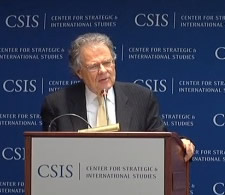New START Ratification: Seeing the Bigger Picture
 |
| Morton Halperin speaks at CSIS |
By Hans M. Kristensen
Kevin Kallmyer at CSIS has an interesting recap of a recent debate between Paula DeSutter and Mort Halperin about the New START Treaty.
Ratification of the treaty is held up in Congress by a handful of Senators who (mis)use questions about, among other issues, verification to extort billions of dollars to pet nuclear modernization projects at the expense of greater U.S. interests.
During the CSIS debate, Mort Halperin provided an enlightening anecdote about how to judge whether ratification of the treaty is in the U.S. interest. It cuts to the heart of what is important and deserves a repost here:
How do you decide whether a Treaty is in the American interest in relation to verification? The question cannot be are we sure that we will have 100% confidence that we would detect the first instance of Russian cheating. The question has to take into account the limits of the Treaty, and some degree of Russian cheating, is it in our interest to have the limit in the treaty, as opposed to not constraining the Russian forces. Our notion of what is acceptable verification goes back to the Reagan administration, it actually goes back before that…because the last time the Joint Chiefs of Staff held the view that a limit was not acceptable unless it could be 100% verifiable was in 1968. At that point, the Administration was planning to put forward a proposal to the Soviet Union to ban the further production of any ballistic missiles or submarines. The Joint Chief’s position then was to we can only include things in the agreement if we could be absolutely certain there will be no Russian cheating. A navy officer came to me one day and said, “Well, we cannot include submarines in the agreement.”
I said, “Why is that?”
He said, “Because the CIA has just come out with its estimate that said the Russians could cheat on an agreement that bans Russia from building any more ballistic missile submarines.”
And I said, “What does it say?”
He said, “It says the Russians could build as many as 3 submarines and we wouldn’t detect it, and only if they build a fourth submarine could we have very high confidence of detection.”
And I said, “How many submarines doe we have now?”
He said, “41.”I said, “How many submarines do we plan to have 10 years from now.”
He said “41.”
I said, “How many submarines do the Russians have now?”
He said, “I think one.”
I said, “How many do we think they will have in 10 years from now.”
He said, “50.”
I said, “So, you prefer a world where we do not limit this and the Russians have 50 submarines and we have 41, to a world where we have 41, and the Russians have [4] until we can be sure we detect the [5th] submarine.”
And he said, “That’s right, the principle is that you do not include something in an agreement that cannot be verified.”
I looked at him and said, “Well, I think I’m going to win this fight…and I did.”
And the Joint Chiefs changed their position then, to what is clearly the correct position. You ask yourself about each limit, including the warhead limit in this treaty; is it in our interest to have this limit, recognizing that there obviously could be some amount of Russian cheating. The question is how much Russian cheating can there be before we detect it, and the question is what is the strategic significance of that cheating. We have seen no such analysis, because no such analysis that could be presented would be the slightest bit persuasive. The fact is that with the margin of deterrence we have to deter a Russian attack, that the margins of cheating the Russians can do is simply insignificant to the security to the United States.
Check out the full debate at the CSIS web site.
This publication was made possible by a grant from Carnegie Corporation of New York and Ploughshares Fund. The statements made and views expressed are solely the responsibility of the author.
The last remaining agreement limiting U.S. and Russian nuclear weapons has now expired. For the first time since 1972, there is no treaty-bound cap on strategic nuclear weapons.
The Pentagon’s new report provides additional context and useful perspectives on events in China that took place over the past year.
Successful NC3 modernization must do more than update hardware and software: it must integrate emerging technologies in ways that enhance resilience, ensure meaningful human control, and preserve strategic stability.
The FY2026 National Defense Authorization Act (NDAA) paints a picture of a Congress that is working to both protect and accelerate nuclear modernization programs while simultaneously lacking trust in the Pentagon and the Department of Energy to execute them.